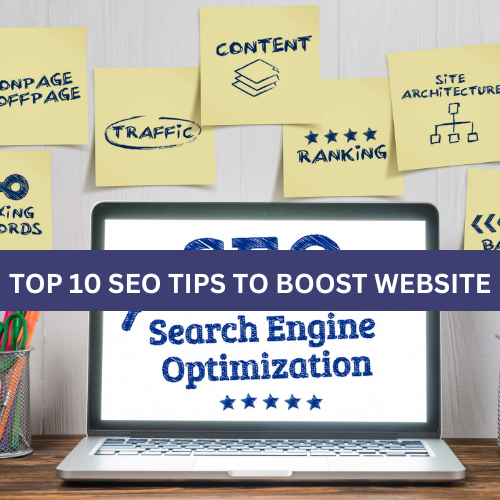10 SEO TIPS TO BOOST YOUR ORGANIC RANKING & TRAFFIC
The increasing competitiveness of the online market is a prevailing trend in today’s digital era. It has become customary for businesses, regardless of their size (startup, small-sized firm, or enterprise), to maintain a competitive edge in their respective industries. In this regard, implementing an SEO strategy tailored to the specific industry is crucial. As the digital landscape grows increasingly competitive year after year, the importance of achieving higher search engine rankings has become more critical than ever. While paid advertising campaigns, promotions, and advertisements require financial investment, the significance and impact of organic traffic cannot be understated. Below are the 10 most important tips to boost organic ranking & Traffic
- Create a backlink strategy- Backlinks refer to links that point to your website from other external sites. They serve as endorsements, indicating that your website is an authoritative source and deserving of attention. Having a higher number of backlinks generally has a positive impact on your rankings. However, the quality of those backlinks is equally important. If your website is linked to spammy or low-quality sites, it can adversely affect your rankings. Conversely, receiving high-quality backlinks from reputable and authoritative websites can significantly improve your site’s reputation. To set a target for your backlink strategy, you can use tools like Ahrefs to determine the ‘Domain Authority’ of your main competitors. If your rating is similar to theirs, you should be able to compete effectively. If not, there are various tactics available to enhance your domain authority.
- Have a mobile-friendly site- Mobile optimization emerged as a significant focus of one of Google’s major updates. If your website lacks mobile responsiveness or is not user-friendly on mobile devices, there is a risk of losing traffic and experiencing lower rankings. Considering that mobile devices now contribute to around half of the global web traffic, Google’s emphasis on mobile optimization is justified. Users expect a seamless browsing experience, whether they access your website from a desktop or a mobile device, so it’s crucial to deliver on this expectation. Not having a mobile-friendly website can have significant negative implications for your business in two key ways. Firstly, it can result in a failure to cater to a substantial portion of your existing customer base. Secondly, it can lead to a decrease in organic traffic from both desktop and mobile searches on Google.
- Write content around those keywords- After compiling your list of keywords, it’s time to incorporate them into your web pages or posts. When using keywords, it’s crucial to maintain a natural writing style. Keyword stuffing, which involves excessive and unnatural use of keywords, is discouraged by Google and can negatively impact your site’s ranking. Instead, focus on integrating your keywords organically. One way to ensure natural usage is by reading the content aloud and identifying if any keywords sound forced or out of place. Look for synonyms or related words from your keyword list that can be used seamlessly. By creating content that incorporates these keywords effectively, you can optimize your on-page SEO and improve the ranking of your pages.
- Use outbound links- Incorporating sources and references into your content is an important practice. Despite the concern of redirecting traffic away from your site, utilizing outbound links in your content sends a signal to Google that your site is authoritative and associated with other reliable sources. This creates a network of interconnected sites that Google rewards for mutually referencing each other. It’s similar to an academic article gaining popularity based on the number of other papers that cite it. By referring to other relevant and reputable sites, you can reap the benefits in terms of improved organic rankings. Always ensure that the links you include are active and functional, as Google dislikes broken links and continuous linking to such broken references can lead to penalties.
- Check Meta Titles to Optimize CTR- Meta titles and descriptions on a website are frequently noticed by users. Including keywords in meta titles can significantly contribute to higher rankings on search engine results pages (SERPs). Meta titles are limited to 60 characters, while descriptions typically range from 150 to 160 characters. Having a title that contains relevant keywords assists Google in understanding the webpage’s content.
- Focus on Local SEO- For local business owners, it’s beneficial to incorporate local keywords when writing meta descriptions. Google algorithms can enhance the visibility of your page in local search results, particularly when the location is explicitly mentioned. Including your business name, contact information, and address on your website, as well as utilizing Google My Business (GMB), adds credibility and authenticity to your local business.
- Start a blog and write consistently- In the realm of online success, blogging plays a crucial role and attracts new and relevant traffic to your website. Websites that incorporate blogs enjoy 97% more indexed links, which means that Google can crawl your business more effectively and display your site in relevant search results pages. Blogging is a long-term strategy that gradually increases traffic to your site over time. It’s advantageous to start blogging as early as possible to maximize its benefits. Blogs provide an excellent platform to engage with your customer base. For e-commerce businesses, writing about seasonal shopping guides, staff selections, or product showcases can be particularly effective. Additionally, having new blog posts allows you to share valuable content through your social media channels and email campaigns. Remember to ensure that each blog post is original, of high quality, and has sufficient length.
- Google’s ranking algorithm- Google implements daily updates to its search algorithm, and in addition to these regular updates, we can gain insights into how Google’s algorithm functions by examining major updates. It is crucial to understand Google’s preferences and strive to align with each significant update. Keeping track of these updates can be done through a comprehensive list. By consistently optimizing your SEO strategy in line with these updates, you can maintain consistent search volume. To monitor the changes in the algorithm, it is advisable to regularly analyze your metrics on Google Analytics. This way, you can identify any potential impact from Google updates and stay informed.
- Website Security- According to a study, a hacker appears on the web every 39 seconds, highlighting the need for robust website protection measures. Enabling the HTTPS protocol for your website is an effective way to safeguard your website and its content. Not only does it enhance security, but it also has SEO benefits. Google recognizes and favors encrypted websites, providing a minor SEO boost to such sites.
- Secure your site with HTTPS- In today’s digital landscape, having a secure website is crucial, and it has been a ranking factor in Google’s algorithm since 2014. If your website does not have the HTTPS protocol in its URL, it is considered insecure, which can result in lower search traffic from Google. By obtaining an SSL certificate, you can ensure the security of your website and provide reassurance to customers when sharing sensitive information, such as credit card details. If you do not currently have an SSL certificate and would like to display HTTPS before your store’s URL, it is recommended to acquire an SSL certificate.




